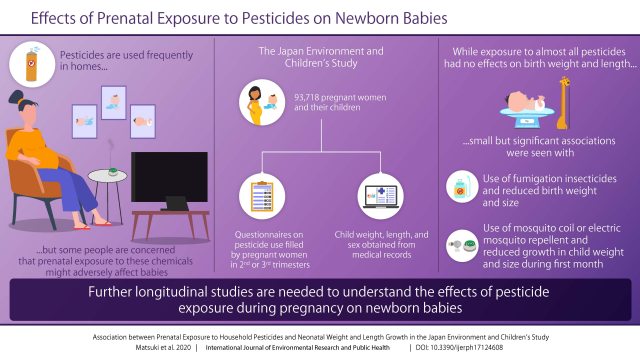

Although pesticides are ubiquitously used, some people are concerned that exposure to these chemicals during pregnancy might adversely affect babies. To understand in depth about these effects, researchers at Nagoya City University on behalf of the Japan Environment and Children’s Study (JECS) Group conducted a detailed study on 93,718 pregnant women and their babies. In JECS, the women had filled in self-reporting questionnaires on the frequency of pesticide use during their second or third trimesters. Then, data on children’s weight and length were collected from medical records. While the findings showed that exposure to almost all the pesticides evaluated had no effects on birth weight and length; however, small but significant associations were seen between exposure to fumigation pesticides and a reduction in birth weight. Moreover, exposure to mosquito coils and electric repellants was seen to be associated with a slight reduction in length in the first month. Thus, there needs to be some attention drawn towards further studies about the effects of pesticide use during pregnancy.
What is it about?
This study aimed to understand whether the use of common chemicals like pesticides and insecticides during pregnancy has an impact on the growth of infants.
Why is it important?
In Japan, insecticides and pesticides are widely used in households. These compounds may pose health risks to humans, especially children with prenatal exposure. Further longitudinal studies should conduct a more comprehensive analysis to understand these effects in detail.
What this study adds
Researchers found that fumigation insecticide exposure led to reduced birth weight in infants, by approximately 12 g. Moreover, the use of common chemicals containing pyrethroids, like mosquito coil or electric repellent mats, led to reduced child length by 0.1 cm in the first month. While these associations were small, they cannot be ignored and call for further studies.
Infographic prepared using the following the Freepik
Evidence before this study
Previous animal studies have shown that pyrethroids in insecticides may affect the thyroid gland. Moreover, an epidemiologic study showed that maternal exposure to pyrethroids in the first 6 months of pregnancy was associated with a small decrease in birth weight. In contrast, some studies have found no such association.
* The findings and conclusions of this paper and the lay-summary article are solely the responsibility of the authors and Science writer of this article, and do not represent the official views of the Japanese government.
Title of the paper: Association between Prenatal Exposure to Household Pesticides and Neonatal Weight and Length Growth in the Japan Environment and Children’s Study
Authors: Taro Matsuki, Takeshi Ebara, Hazuki Tamada, Yuki Ito, Yasuyuki Yamada, Hirohisa Kano, Takahiro Kurihara, Hirotaka Sato, Sayaka Kato, Shinji Saitoh, Mayumi Sugiura-Ogasawara, Michihiro Kamijima and The Japan Environment and Children’s Study (JECS) Group
Journal: Int J Environ Res Public Health. 17(12):4608, 2020.

This contents and the article contribute the following Sustainable Development Goals:



